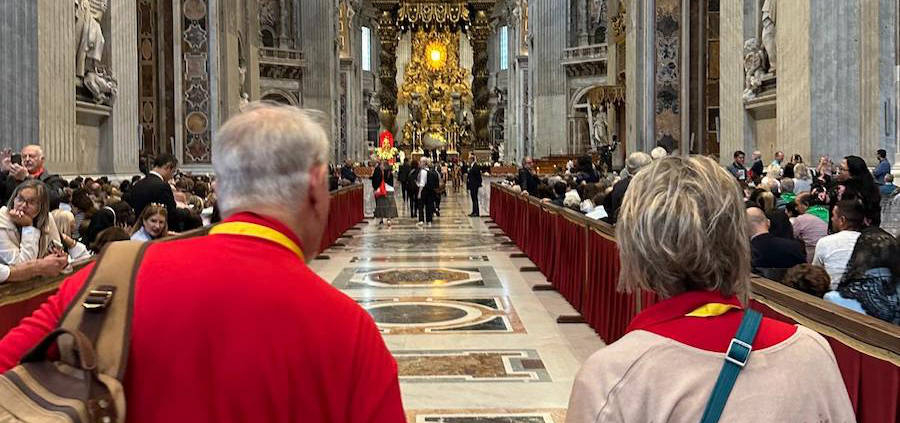A Pilgrim’s Adventure: Rome and Synodality: An Afterword by Christopher V. Clement
My brother, Chris Clement, was the catalyst for our pilgrimage to Rome for the Jubilee of Synodal Teams and Participatory Bodies. Our adventure began when he expressed a desire to meet the new American pope soon after his installation. He is an “everyday” New Orleans Catholic with 12 years of Catholic education, including five years at Jesuit High School. He holds an MBA and works in the construction trades.
Prior to our pilgrimage to Rome, Chris had heard nothing about synodality through his parish. In preparation for our trip, he read synodal resources that I had provided. During the Jubilee, he attended sessions, listened deeply, and participated in prayers and liturgies. These reflections of his pilgrimage experience can serve as a witness of what an American Catholic “in the pews” can easily grasp about synodality and its importance for the future of the church.
Pope Francis and Pope Leo XIV both remind us that we must all experience a conversion to synodality and not just demonstrate an understanding of the concept. If my brother is now is convinced that synodality is understandable and essential, our American bishops—and American Catholicism in general—have no excuse but to take a closer look and open themselves to what the Holy Spirit has to say.
— Patricia E. Clement, Co-founder, Pentecost Vigil Project
I spent last weekend in Rome with 1,500 pilgrims from around the world. We were attending the Jubilee of Synodal Teams and Participatory Bodies at the Vatican. I was part of a group of 14 Americans representing every region of our country. There were a total of 120 Americans at the Jubilee.
Pope Leo opened with a prayer to welcome us to the Vatican. He expressed concern about the environment and mentioned that entire countries have already started to experience saltwater intrusion in their daily lives. How does one bring a message of love and hope to entire countries that no longer have a place to live?
All of us need to listen to each other. All of us need to help each other and take responsibility for proclaiming the gospel. This is the definition of synodality.
Pope Leo specifically called on the United States and Canada to help our brothers and sisters in Mexico and South America to embrace synodality. The key is for local priests, bishops, cardinals, and laypeople to open their hearts to peace and synodality.
There will be resistance. We must be patient and look for ways to understand and move forward with communion and inclusion of everyone.
A young representative from Africa said that his entire continent is embracing synodality. Young people in particular embrace it and pass it on to the parishes and dioceses.
Another speaker from Fiji represented all of the island nations that make up Oceania, a vast area in the Pacific Ocean. This region has been embracing synodality for over three years. We have much to learn from them.
Our next speaker was from the Middle East. They are desperate for help and hope. It is amazing to see the strength and endurance in many of these people that have lost everything to war. The Latin Church needs to respect, listen, and understand the Eastern Church. We need to open our hearts to the Holy Spirit so as to lead a spiritually fulfilling life.
Next we heard from Latin America and the Caribbean. These regions are working hard to promote love, prepare written texts, and spread the word to their parishes. They have set up virtual meetings to listen, learn, and reflect on the daily challenges that they face. Some have created websites with academic articles, training, and synodal-implementation opportunities. The Latin American people live and worship with enthusiasm. This can be a model for all of us.
The Synod process must allow for inclusion and understanding of different points of view. The important thing is to listen, understand, and share common experiences, then move forward through the Holy Spirit.
In Europe, the challenges are different. Secular life is so entrenched that preaching synodality can be very difficult. Yet the potential for success is great, especially among women who want more opportunities to participate in the life of the church. We need to encourage their efforts. The church must work to promote equal rights for both men and women, across all social classes. Inclusion and listening are crucial.
The report from Asia was very promising. It is a continent marked by brutalism and misunderstanding, yet synodality is bringing people together. According to our speaker, there is a renewed interest in dialogue, mutual respect, and harmony. Whole countries are working together to overcome resistance to change. Synodality is bringing transformative leadership by feeding the people and inspiring youth to spread the word. Pope Leo congratulated the Asian contingent on their continued success in overcoming differences in their region.
We must overcome oppression. We must help open and encourage dialogue between the east and the west. In the spirit of synodality, we all must listen, share, understand, and encourage one another’s efforts. The Holy Spirit is counting on us.
This Jubilee, for me, became an invitation to a new life in Christ. ♦





Leave a Reply
Want to join the discussion?Feel free to contribute!